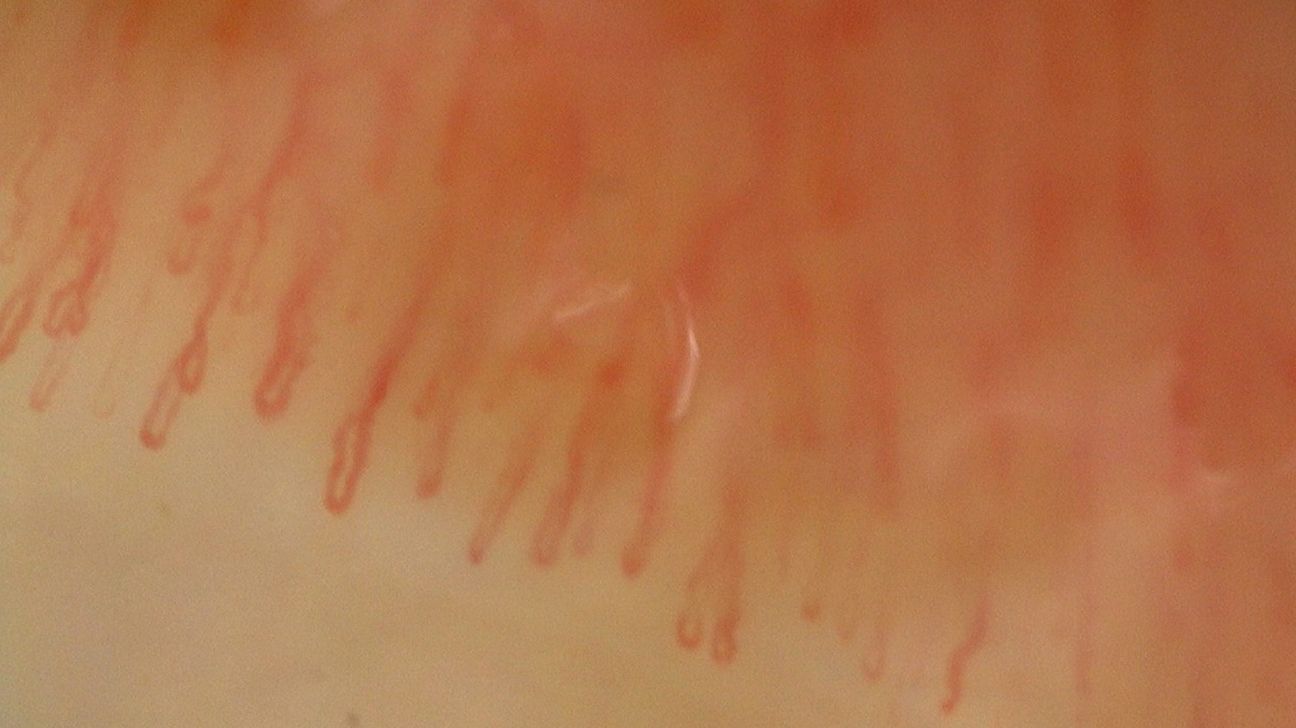Nailfold capillaroscopy is a noninvasive test used to screen for changes in the small blood vessels at the base of your fingernails. It’s most used to identify features of some autoimmune conditions.
Nailfold capillaroscopy, or a nail blood vessel test, is a commonly performed test for conditions that cause changes to the small blood vessels throughout your body. The test is generally inexpensive, noninvasive, and widely available.
You may need to receive nailfold capillaroscopy if a doctor suspects you have an autoimmune disease or connective tissue disease that causes changes to your small blood vessels called capillaries. Researchers are continuing to examine if it might also be useful for detecting changes caused by some non-autoimmune conditions like type 2 diabetes.
Read on to learn more about nailfold capillaroscopy, including what conditions it’s used to screen for, what the test involves, and what the results mean.

Nailfold capillaroscopy is a well-established technique for assessing your microcirculation, which refers to blood flow through small blood vessels called capillaries. It can assess various factors of your nailfold capillaries, including:
- capillary density
- blood flow rate
- blood vessel abnormalities
Sometimes, changes to your capillaries may be visualized with the naked eye, but nailfold capillaroscopy allows doctors to more easily see these changes with magnification.
Nailfold capillaroscopy is now a mainstream test for doctors who specialize in autoimmune conditions called rheumatologists. A scleroderma pattern characterized by bleeding and giant capillaries helps differentiate systemic sclerosis from Raynaud’s phenomenon.
Doctors often combine it with a blood test to look for autoantibodies. Autoantibodies are molecules produced by your immune system that tell white blood cells to mistakenly attack healthy tissue in your body.
What are systemic sclerosis and Raynaud’s phenomenon?
Systemic sclerosis, also called scleroderma, is a chronic autoimmune connective tissue disorder that causes degenerative changes in your:
- skin
- joints
- internal organs
It has a high risk of severe complications. Improvements in treatment have led to increased survival rates. The 5-year survival rates have improved to up to
Raynaud’s phenomenon is a disorder characterized by spasms in your capillaries that lead to paleness in your fingers. It’s common and doesn’t usually cause problems, but doctors often want to make sure that the symptoms aren’t caused by another underlying condition.
What other autoimmune diseases can nailfold capillaroscopy help diagnose?
Nailfold capillaroscopy may also be used to help detect diseases that affect circulation through your small blood vessels, such as connective tissues disease and autoimmune diseases like:
Nailfold capillaroscopy is noninvasive imaging test that’s essentially risk-free. The test uses magnification and a light to visualize the capillaries in your nail. It provides magnification of more than 50 times and up to 500 times.
There’s a very small chance that you might have a reaction to oil put on your nails to help with the imaging.
No specific preparation is needed for nailfold capillaroscopy. The test is usually performed in a doctor’s office.
- Your doctor or nurse will explain the procedure and why they’re performing the test.
- You’ll put your hand on a desk or other flat surface. They may put a drop of oil at the base of your fingers.
- Your nurse or doctor will then scan the base of your nails with a small tool with a light and a digital microscope. It might be connected to a computer.
- The image will appear on a computer screen where the medical professional can look for atypical changes.
Some newer devices that have been developed are compatible with cell phones.
Nailfold capillaroscopy is known to be effective at diagnosing systemic sclerosis and other rheumatic conditions. The usefulness for non-autoimmune disease needs more research.
Some recent studies have demonstrated potential utility for detecting other conditions like:
Your doctor can use the results of your test to look for changes in your capillaries that are characteristic of certain condition. The results need to be interpreted by a healthcare professional specifically trained in these images. Even when interpreted by an expert, there may be a high risk of misinterpretation.
Your doctor will look for signs of problems with your blood vessels, such as:
- swelling
- leaking
- unusual shapes
Nailfold capillaroscopy is a relatively cheap test, especially compared to other forms of imaging. Part or all of the test itself might cost less than $100. Part or all of the test may be covered by your insurance provider when deemed medically necessary.
Nailfold capillaroscopy is a test used to help identify autoimmune conditions that cause changes to your blood vessels. It’s commonly used to differentiate an autoimmune condition called systemic sclerosis from Raynaud’s phenomenon.
Your doctor may combine nailfold capillaroscopy with other tests for diagnosing autoimmune conditions, such as blood tests to look for autoantibodies.




